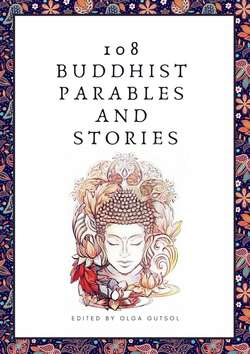Читать книгу 108 Buddhist Parables and Stories - Olga Gutsol - Страница 6
На сайте Литреса книга снята с продажи.
4. FIRST MEDITATION
ОглавлениеWhen Siddhartha was nine, King Suddhodana, his royal family and all his ministers attended the ceremony of the first plowing of the fields. On that day Siddhartha saw the actual plowing; he saw a man naked to the waist prodding a water buffalo to pull a plow. It was very close to noon, and the sun shone relentlessly on the man’s bare back. He was sweating profusely and visibly tired from walking up and down in the field making the furrows. Intermittently, he would whip the reluctant buffalo. The buffalo had to pull very hard with the yoke upon its body. The plow turned up the soil exposing the worms that made their homes there. Siddhartha then realized why so many small birds were hovering near the ground. They were eating the live worms and other tiny bugs that laid bare for their easy picking. Just then, a hawk swooped down and caught one of the small birds.
Siddhartha watched in silence. He felt the toil of the man who ploughed the field in the hot sun. He felt the struggle of the water buffalo chained to the plow. He felt the pain of the worms cut by the plow. It was heart wrenching to witness the worms, the insects, and the small bird losing their lives so abruptly.
The noonday sun was extremely hot. Siddhartha took shelter under a rose-apple tree. The leaves provided a much needed shade away from the heat. After sitting quietly for a while, Siddhartha thought about what he saw and recognized that the man, the water buffalo, the birds, and the worms had one thing in common: each of them was tied to the conditions of its life. A worm was tied to the condition that it was a food source for birds. A small bird was bound by the condition that it might fall prey to larger birds. A water buffalo had to live in captivity and work for its captors.
He recognized that life conditions brought fear and pain at times, and enjoyment at others. In one moment, the small bird was enjoying the worms, but in the next moment, it was food for the hawk. Siddhartha observed that the conditions were different for everyone. Some animals enjoyed a greater degree of freedom and safety than others. The peacocks of the royal gardens certainly led a better existence than that of a water buffalo. It was the same with people. One thing stood out above all else: regardless of what conditions they were born with, all living things had a universal wish to live in peace and happiness. All living things wanted to avoid suffering.
King Suddhodana saw Siddhartha sitting under the tree, and in the king’s heart his greatest fear was taking shape: Siddhartha would leave him one day in search of the truth.
